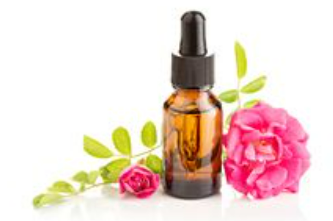Discover Rose Essential Oil

Rose essential oil is one of the most prized and luxurious essential oils available on the market. It is derived from the petals of the rose plant, specifically the Damask rose (Rosa damascena) and the Bulgarian rose (Rosa × damascena trigintipetala), through a process of steam distillation. Rose oil has a strong floral scent that is both sweet and intoxicating, making it a popular choice for use in perfumes, cosmetics, and aromatherapy.
Extraction Process of Rose Oil
The process of distilling rose essential oil is a delicate and time-consuming process that requires careful attention to detail. Here is an overview of the steps involved:
- Harvesting - The petals of the rose flower are carefully harvested by hand, usually early in the morning when the flowers are at their most fragrant.
- Loading the still - The petals are loaded into a still along with water, and the still is sealed to prevent any steam from escaping.
- Heating - The still is heated gently, causing the water to boil and creating steam that passes through the petals.
- Condensation - As the steam rises, it passes through a cooling coil, where it condenses back into a liquid.
- Separation - The liquid that is collected in the condenser is a mixture of rose oil and water. The oil is lighter than water, so it floats on top of the water and can be separated.
- Collection - The rose oil is collected and stored in dark glass bottles to protect it from light and air.
The entire process of distilling rose essential oil can take several hours, and it takes a significant amount of rose petals to produce a small amount of oil. This is why rose essential oil is so expensive and highly prized. The quality of the oil can also vary depending on factors such as the species of rose, the location of the harvest, and the skill of the distiller. However, when done correctly, the result is a highly fragrant and luxurious oil that is cherished for its many therapeutic properties.

Chemical Compounds In Neroli Essential Oil
Rose essential oil contains a complex array of chemical compounds, many of which have been found to have therapeutic properties. The primary constituents of rose oil include citronellol, geraniol, nerol, linalool, phenyl ethanol, eugenol, and several other terpenes and phenols. Citronellol and geraniol are the two most abundant compounds in rose oil, accounting for up to 80% of the oil's total composition.
What Are The Health Benefits of Rose Essential Oil?
Rose essential oil has been used for centuries in traditional medicine and aromatherapy for its many therapeutic properties. Some of the most well-known health benefits of rose oil include:
- Relaxation and stress relief - The sweet floral scent of rose oil is known to have a calming and relaxing effect on the mind and body. It is often used in aromatherapy to promote relaxation, reduce stress and anxiety, and improve mood.
- Skin care - Rose oil is widely used in skincare products due to its anti-inflammatory, antibacterial, and antioxidant properties. It can help soothe and heal a range of skin conditions, including acne, eczema, and rosacea, and can also help reduce the appearance of fine lines and wrinkles.
- Pain relief - The anti-inflammatory and analgesic properties of rose oil make it an effective natural remedy for relieving pain and inflammation associated with arthritis, muscle aches, and menstrual cramps.
- Hormonal balance - Rose oil is known to have a balancing effect on the hormones, making it useful for treating symptoms of PMS and menopause. It is also believed to have a positive effect on libido and sexual function.
How Does the Geranol in Rose Essential Oil Benefit Gut Health?
Geraniol, a monoterpene alcohol, is a major constituent of rose and geranium essential oils and has been shown to possess numerous health benefits, including improving gut health.
Geraniol has been found to have strong antimicrobial properties, which means it can help to inhibit the growth of harmful bacteria in the gut. This can be particularly beneficial for individuals who suffer from gastrointestinal issues, such as bloating, gas, and diarrhea.
In addition, geraniol has been shown to have anti-inflammatory properties, which can help to reduce inflammation in the gut and promote healing of the intestinal lining. Chronic inflammation in the gut can contribute to the development of numerous health issues, including inflammatory bowel disease (IBD) and irritable bowel syndrome (IBS).
Furthermore, geraniol has been found to have antioxidant properties, which means it can help to protect the gut cells from damage caused by harmful free radicals. This can be beneficial in preventing oxidative stress, which has been linked to the development of numerous health issues, including cancer.
Overall, the antimicrobial, anti-inflammatory, and antioxidant properties of geraniol make it a potentially beneficial natural remedy for improving gut health. However, it's important to note that further research is needed to fully understand the mechanisms by which geraniol works and to determine the optimal dosage and method of administration for therapeutic use.

What are the best ways to use Rose Essential Oil?
There are many different ways to use rose essential oil, depending on your needs and preferences. Here are some of the most popular methods:
- Aromatherapy - Add a few drops of rose oil to a diffuser or vaporizer to fill the room with its sweet floral scent. This can help promote relaxation and reduce stress and anxiety.
- Topical application - Mix a few drops of rose oil with a carrier oil, such as coconut or jojoba oil, and apply to the skin. This can help soothe and heal a range of skin conditions, and can also be used as a natural perfume.
- Bath - Add a few drops of rose oil to your bathwater for a luxurious and relaxing soak. This can help soothe sore muscles, reduce stress, and promote relaxation.
- Massage - Mix a few drops of rose oil with a carrier oil and use for a relaxing massage. This can help relieve muscle tension, reduce pain and inflammation, and promote relaxation.
In conclusion, rose essential oil is a versatile and luxurious essential oil that offers a wide range of health benefits. Its complex array of chemical compounds makes it an effective natural remedy for a range of conditions, including stress, skin care, pain relief, and hormonal balance. Whether you prefer to use it in aromatherapy, topically, or in the bath, rose oil is a wonderful addition to any self-care routine.
What does Rose Essential Oil smell like?
The smell of rose essential oil is sweet, floral, and intensely rich. It has a warm and inviting scent that is both uplifting and calming, and is often described as romantic, elegant, and sophisticated. The aroma is often likened to the fresh scent of a rose garden in full bloom, with a subtle hint of spice and earthiness. The intensity of the fragrance can vary depending on the quality of the oil and the specific species of rose used, with some oils having a more subtle aroma than others. Overall, the scent of rose essential oil is highly desirable and sought after, making it a popular choice for perfumes, skincare products, and aromatherapy blends.

What other essential oils does Rose Essential Oil blend well with?
Rose essential oil has a sweet and floral aroma that blends well with a variety of other essential oils. Here are some oils that complement rose essential oil and create delightful blends:
- Lavender essential oil - The calming and soothing properties of lavender complement the uplifting and romantic scent of rose, making this a popular combination for relaxation and stress relief.
- Jasmine essential oil - Both rose and jasmine essential oils are known for their romantic and sensual properties, making them a popular combination for creating romantic and aphrodisiac blends.
- Geranium essential oil - Geranium essential oil has a floral scent similar to rose, making it a perfect complement. It can help to enhance the mood-lifting properties of rose essential oil and create a balanced and harmonious blend.
- Sandalwood essential oil - The woody and earthy aroma of sandalwood can help to ground the sweet and floral scent of rose, creating a calming and meditative blend.
- Frankincense essential oil - Frankincense has a warm and resinous scent that can add depth and complexity to the sweet and floral aroma of rose, creating a sophisticated and luxurious blend.
Overall, rose essential oil blends well with a wide variety of other essential oils, making it a versatile and popular choice for aromatherapy blends and natural perfumes.
Enter your email below and I’ll share new articles, reflections, and practical insights as they’re published.


